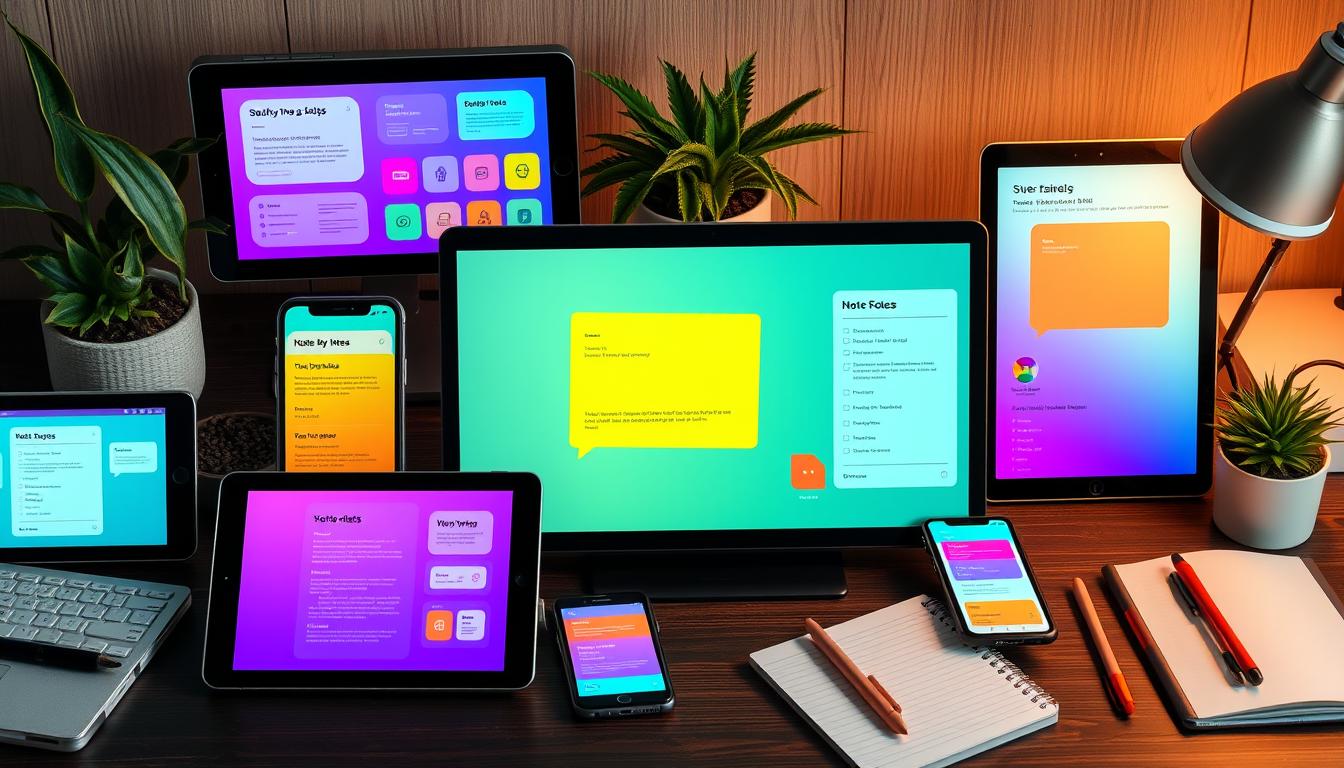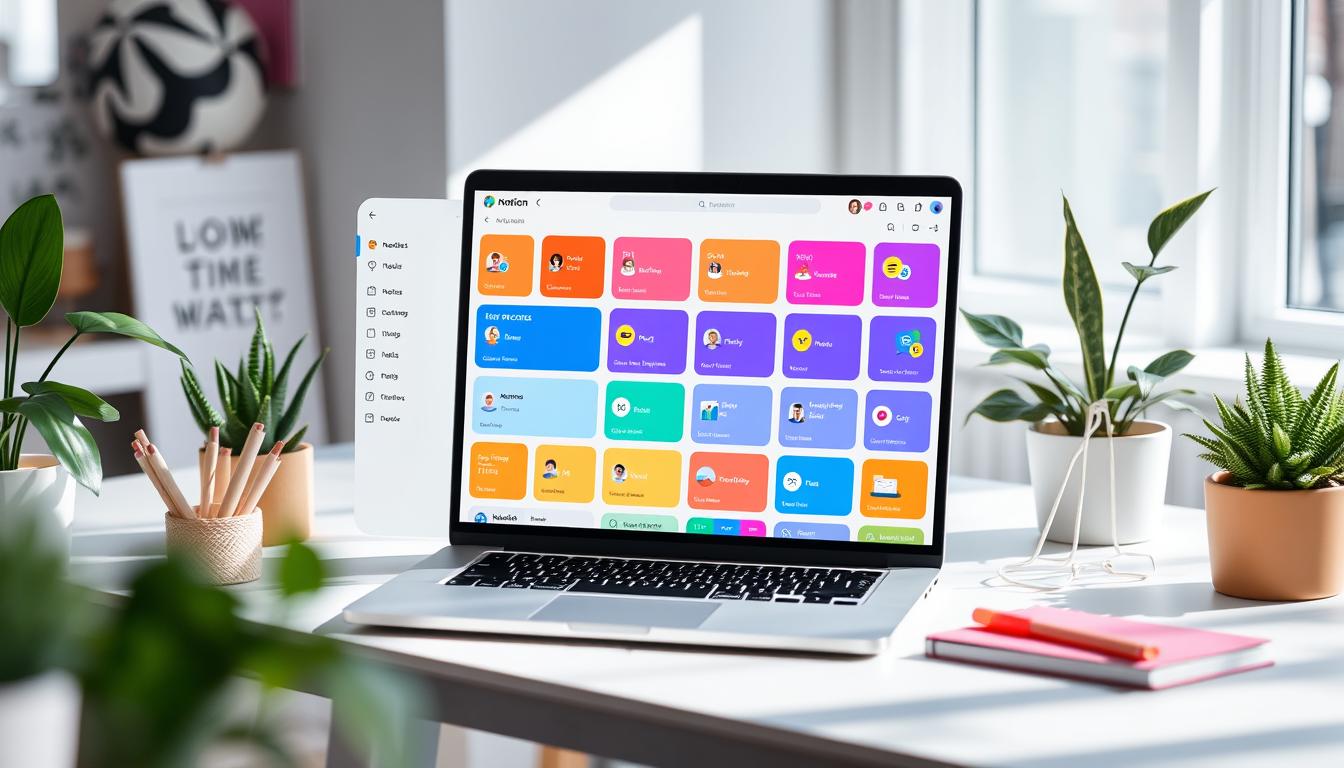Did you know over 45 note-taking apps were tested for 2024? The top 5 are Microsoft OneNote, Apple Notes, Google Keep, Notion, Obsidian, and Joplin. These apps help you organize thoughts, capture ideas, and boost productivity.
In today’s digital world, taking notes well is key. Whether you’re a student, professional, or just need to keep track of tasks, the right app matters.
These apps range from free and open-source to powerful, feature-rich tools. They offer cloud storage, cross-platform syncing, AI note summarization, and integration with productivity tools. They aim to make your workflow smoother and boost your productivity.
Key Takeaways
- Over 45 different note-taking apps were tested to find the best ones for 2024.
- The top 5 note-taking apps include Microsoft OneNote, Apple Notes, Google Keep, Notion, and Obsidian.
- Microsoft OneNote offers 5GB of free storage and integrates AI features like Copilot.
- Joplin, an open-source alternative to Evernote, is also among the top note-taking apps.
- The best note-taking apps offer a range of features, including cloud storage, cross-platform synchronization, and AI-powered note summarization.
Understanding Modern Note-Taking in the Digital Age
Note-taking has changed a lot, moving from paper to digital. In 2024, digital note-taking is key. It offers digital note organization, productivity tools, and mobile note-taking and lecture note capture. These changes have changed how we handle information.
From Paper to Digital Notes
Studies show laptop note-takers do as well as those with paper. But, those who write by hand do better on complex questions. This shows writing helps us remember and understand better.
Tablets and digital tools have made switching to digital easier. They let us write, draw, and highlight text digitally. This opens up new learning chances and makes organizing notes easy.
Why Digital Note-Taking Matters in 2024
In today’s world, quick access to notes is essential. Digital note-taking lets you get to your notes anywhere. This keeps you organized and productive, whether at school, work, or on the move.
Key Benefits of Digital Note Organization
Digital note organization has many benefits. It lets you sort, tag, and find notes easily. Tools like Microsoft OneNote and Evernote make managing notes better. They also help you search text in images and add multimedia.
“Writing notes on paper has been extensively researched and provides high retention rates, but digital note-taking tools have expanded learning opportunities and benefits for students.”
Apps like Obsidian let you link notes together. This helps you understand and see connections better. As we use more digital tools, the importance of digital note organization will keep growing.
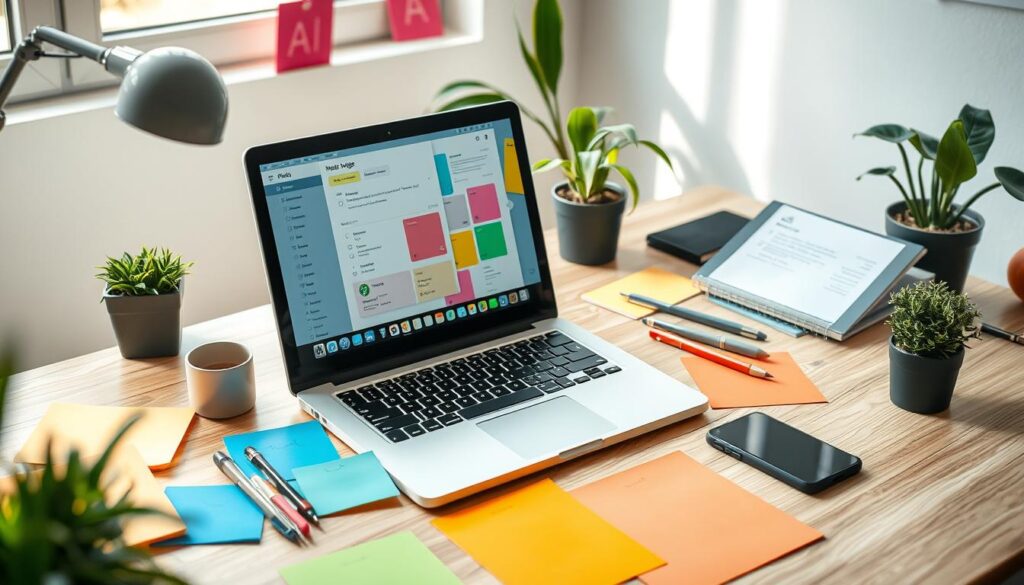
Essential Features of Top 10 Note-Taking Apps
The best note-taking apps of 2024 have many features to help you stay organized and productive. They offer powerful search tools, tagging systems, and easy syncing across devices. You’ll also find advanced features like mind mapping software, collaborative note sharing, handwriting recognition, and audio-to-text transcription.
For example, Microsoft OneNote lets you add text, images, and drawings freely. Notion provides lots of customization and teamwork tools. Today’s top apps also have web clipping, OCR, voice notes, and AI search.
Being able to organize your notes and integrate with other tools is key. ClickUp Docs, part of the ClickUp suite, has an AI writing assistant for $7 a month. Google Keep is free and easy to use, syncing across Android, iOS, and the web.
| App | Satisfaction Rating | Pricing | AI Features |
|---|---|---|---|
| ClickUp | 4.7/5 on G2 and Capterra | Free Forever, Unlimited ($7/user/month), Business ($12/user/month) | ClickUp Brain AI assistant ($7/user/month) |
| Google Keep | N/A | Free | None |
| Microsoft OneNote | N/A | Free, part of Microsoft 365 subscriptions | None |
| Bear Notes | N/A | Free, Pro ($2.99/month or $29.99/year) | None |
Today’s note-taking apps offer a wide range of features. They meet the needs of students, professionals, and anyone looking to improve their digital workflow.
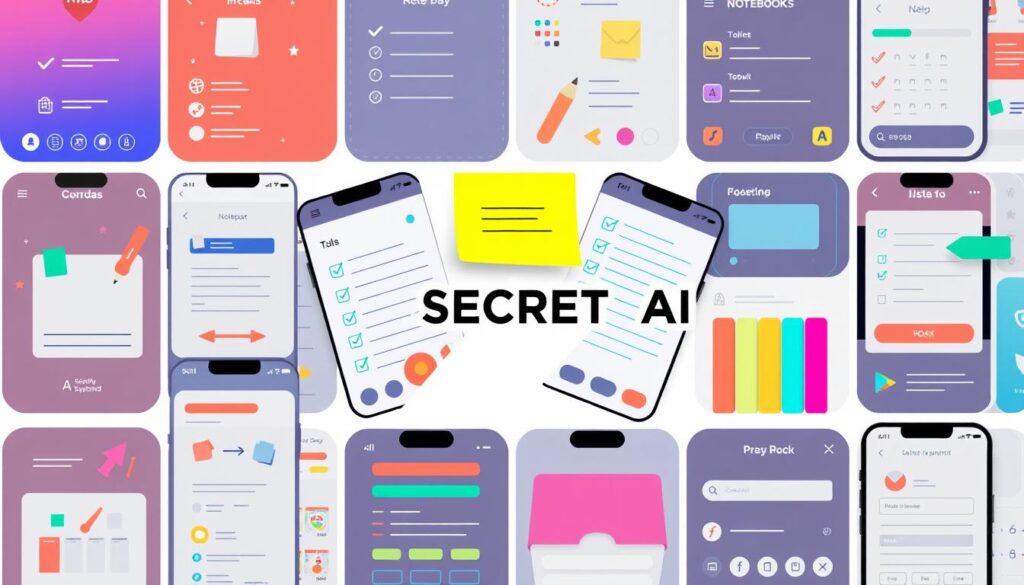
Note-Taking Apps and Artificial Intelligence Integration
Artificial intelligence (AI) and machine learning have changed how we use note-taking apps. These new features make taking notes more efficient and organized. They also make our notes smarter.
AI-Powered Note Summarization
One cool feature in note-taking apps is automatic note summarization. Apps like Microsoft OneNote and ClickUp use AI to make long notes shorter. This saves time and helps you quickly understand the main points.
Smart Organization and Tagging
AI also helps with organizing your notes. These apps suggest tags and categories based on your notes. This keeps your notes tidy and easy to find.
Voice-to-Text Capabilities
Voice-to-text is another AI feature that’s changing note-taking. Apps like Notta, Otter, and Rev turn your voice into text. This makes it easier to jot down ideas and thoughts.
As AI and machine learning get better, note-taking apps are getting smarter. They help users work more efficiently and effectively.
| App | AI Features | Pricing |
|---|---|---|
| Albus | Infinite canvas for generating sticky notes with text and images using ChatGPT AI prompts | Free plan available |
| Mem | AI integration in paid version for team collaboration | Free plan for personal use, paid plans start at $14.99/month |
| Microsoft OneNote | Copilot AI integration for generating and editing notes | Free plan available, paid plans start at $6.99/month, Copilot Pro add-on at $20/month |
| Notion | AI tools for generating text from prompts and automating actions | Free plan available, paid plans start at $10/month with additional AI features add-on at $10/user/month |
| Personal AI | Create custom AI models based on personal data, with free plan limited to 15,000 words and paid plan at $15/month for 1.5 million words and two AI personas | Free plan, paid plan at $15/month |
| Reflect | Integration of ChatGPT-4 for custom prompt-based AI responses | $10/month (billed annually) |
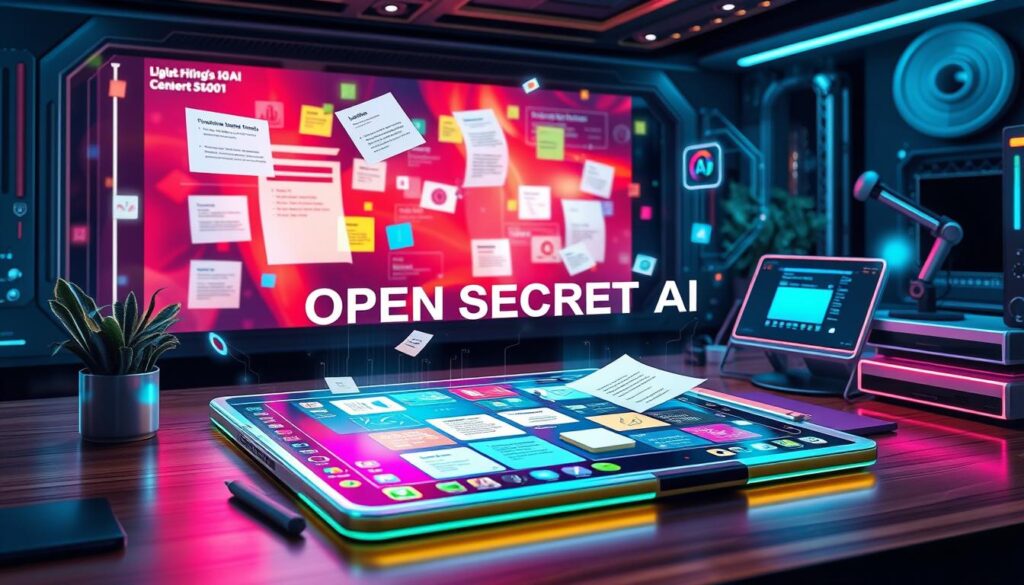
AI and machine learning are changing how we use note-taking apps. Features like summarization, organization, and voice-to-text are making our work more efficient. These advancements empower users to work smarter and more productively.
Cloud Storage and Cross-Platform Synchronization
In today’s world, cloud-based note storage and cross-platform syncing are key. They let users access their notes from any device. This makes switching between desktop and mobile easy.
With more people working remotely, it’s vital to jot down ideas and organize info on the go. This feature is now more important than ever.
Mobile Accessibility
App developers have made mobile versions or web interfaces a priority. This lets users stay productive and connected, no matter the device. Cloud storage keeps notes, documents, and files easily accessible.
Data Security Measures
Note-taking apps focus on keeping data safe. They use strong encryption and secure storage. This protects users’ sensitive info from unauthorized access.
Many apps also offer extra security like two-factor authentication. This adds an extra layer of protection for users’ data.
Backup Solutions
Reliable backup systems are a must in today’s apps. They prevent data loss and give users peace of mind. Notes, ideas, and research are kept safe.
Users can choose cloud services like OneDrive or iCloud. Or they can use self-hosted solutions like Joplin’s GitLab integration. Either way, their data is backed up seamlessly.
Cloud storage, syncing, mobile access, strong security, and backups make today’s note-taking apps powerful. They help users capture, organize, and access their info easily, no matter where they are. These features boost productivity, collaboration, and peace of mind.
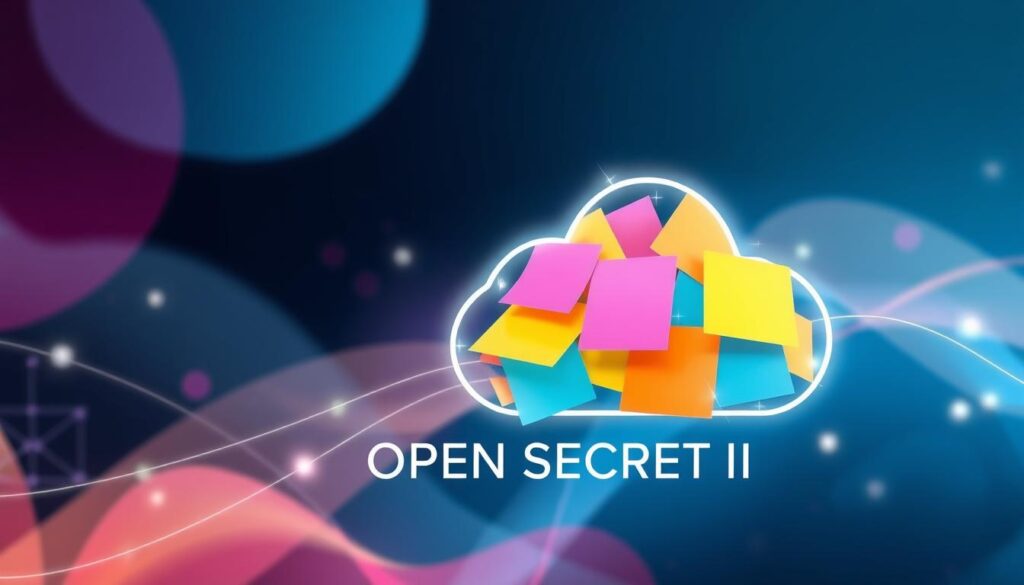
Specialized Features for Students and Professionals
Note-taking apps have grown to meet the needs of students and professionals. They offer features to boost productivity and keep things organized. Students get tools like lecture note capture, audio recording, and ways to sort notes by subject or class. Apps like Microsoft OneNote are great for sketching diagrams or annotating slides.
Professionals need collaborative note sharing, project management tools, and advanced organization features. Mind mapping software helps with brainstorming and organizing big ideas. Some apps have templates for meeting notes, project planning, and research, making note-taking easier for work.
| Feature | Student Benefit | Professional Benefit |
|---|---|---|
| Lecture Note Capture | Easily capture and organize notes from lectures | N/A |
| Audio Recording | Supplement written notes with audio recordings | Record meetings and interviews for reference |
| Collaborative Note Sharing | Share notes with classmates for group projects | Collaborate on notes for team-based work |
| Mind Mapping Integration | Visually organize thoughts and ideas | Brainstorm and plan complex projects |
| Templates | Streamline note-taking for specific classes | Standardize meeting notes, research, and more |
Whether you’re a student or a professional, the right note-taking app can change your game. By using specialized features, you can make your note-taking better and more efficient. This can help you do your best work or studies.
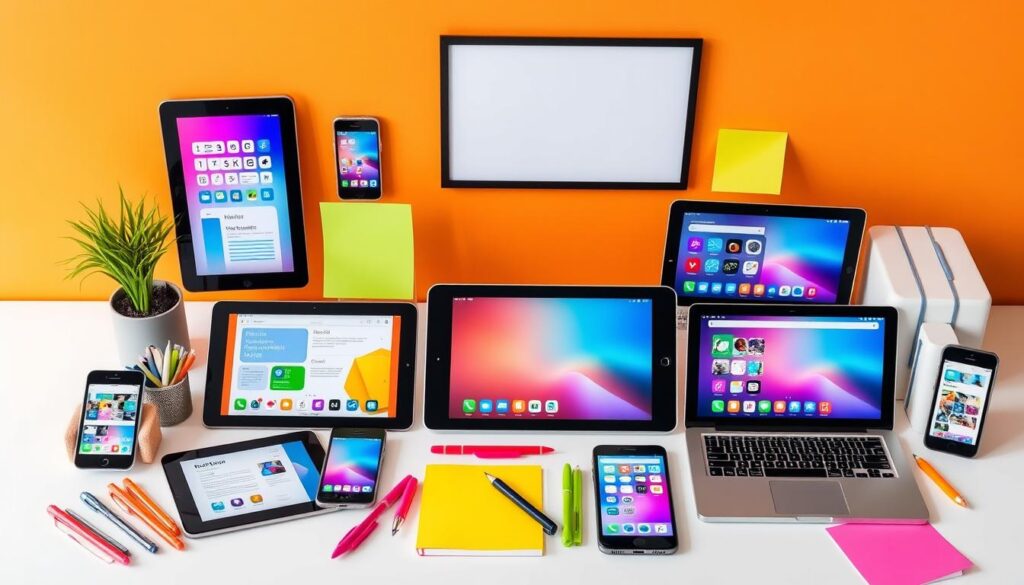
Integration Capabilities with Productivity Tools
Top note-taking apps work well with many productivity tools. They connect with calendar apps, project management software, and team platforms. This helps make work more efficient.
Google Keep works great with Google services. It lets users manage notes with their calendar, email, and documents. Notion also connects well with many apps, like Trello and Asana.
ClickUp is another example. It mixes note-taking with task and project management. This makes it easy to turn notes into tasks, improving teamwork and productivity.
| Productivity Tool | Notable Note-Taking App Integrations |
|---|---|
| Calendar | Google Calendar, Outlook Calendar, Apple Calendar |
| Project Management | Trello, Asana, ClickUp, Basecamp |
| Collaboration | Slack, Microsoft Teams, Google Workspace |
Linking notes to events, making to-do lists, and sharing notes in team tools boosts productivity. Note-taking apps are key in today’s digital workspaces.
“Integrating note-taking with project management and collaboration tools has been a game-changer for our team’s productivity.”
Privacy and Security in Note-Taking Apps
Privacy and security are key in note-taking apps, where sensitive info is often handled. Top apps use strong encryption standards to keep data safe both in transit and at rest.
Apps like Standard Notes, Obsidian, and Joplin focus on keeping user data private. They offer local storage, two-factor authentication, and end-to-end encryption. This ensures your data stays secure and private.
For instance, Obsidian doesn’t need an account or email to start. It saves all data on your device. Joplin lets you save notes locally and adds extra security with two-factor authentication and encryption through Joplin Cloud.
Apps like Notesnook are built in places with strict privacy laws, like Pakistan. They encrypt data on your device before sending it. This boosts user privacy.
Apps must follow laws like the GDPR for users worldwide. Evernote and Microsoft OneNote have strong security features. They offer admin controls and meet many industry standards, keeping user data safe and compliant.
| Note-Taking App | Privacy and Security Features |
|---|---|
| Standard Notes | Does not collect usage information, relies on a self-hosted analytics suite that anonymizes IP addresses |
| Obsidian | Does not require account registration or email address, saves all data locally on the user’s device |
| Joplin | Allows users to save notes locally, can be configured with two-factor authentication and end-to-end encryption through Joplin Cloud |
| Notesnook | Prioritizes customer privacy, encrypts all data on the device before transmission |
| Signal’s Note to Self | Allows users to send encrypted messages to themselves, with an estimated 40 million active users in 2022 |
As we rely more on note-taking apps, understanding data security and user privacy protection is vital. It helps us choose the right app for our needs.
Conclusion
In 2024, note-taking apps have grown to meet many needs. You can find everything from Microsoft OneNote and Notion to Simplenote. These apps use AI, have great organization tools, and work on many devices.
When picking a best note taking app, think about how easy it is to use. Also, consider if it works well with other apps, if it’s safe, and if it meets your specific needs. These apps are key for staying organized and productive.
Today, note-taking apps are changing how we work and learn. They’re more than just a tool; they’re a way to share ideas and stay organized. Even though paper notes are important, digital apps offer a lot of benefits.
FAQ
What are the key features of the top note-taking apps in 2024?
The best note-taking apps sync across devices, have powerful search, and tagging systems. They support multimedia and offer freeform note-taking. You can customize them a lot, collaborate with others, and clip web pages.
They also have OCR, voice notes, and AI for summarizing and organizing your notes.
How are AI and machine learning integrated into modern note-taking apps?
AI in note-taking apps helps with summarizing and organizing your notes. It suggests tags and offers voice-to-text features. Apps like Microsoft OneNote and ClickUp use AI to boost productivity.
Why is cloud storage and cross-platform synchronization important for note-taking apps?
Cloud storage lets you access your notes from any device. It makes switching between desktop and mobile easy. It’s also key for data security and automatic backups.
What specialized features do note-taking apps offer for students and professionals?
Students need features like recording lectures and organizing notes by subject. Professionals benefit from sharing notes, managing projects, and using mind mapping tools.
How do note-taking apps integrate with other productivity tools?
Top apps work with calendars, project management tools, and collaboration platforms. This lets you link notes to events, make to-do lists, and share notes in teams. It boosts productivity and workflow.
How do note-taking apps address privacy and security concerns?
Many apps use strong encryption to protect your data. They offer private notes, secure sharing, and control over data use. They also follow rules like GDPR for users worldwide.
